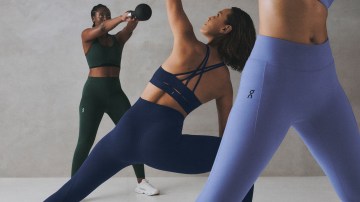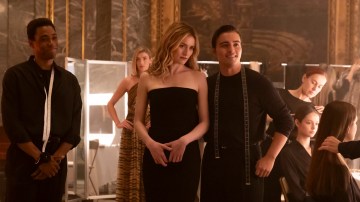This week, I checked in with top execs and analysts to unpack the booming men’s personal care marketplace, which includes buzzy celebrity partnerships and better-for-you formulations. I spoke with John Ludeke, svp of global marketing for category leader Dr. Squatch, about its new Mike Tyson collaboration and the power of partnerships. Additionally, former L’Oréal president Nathalie Gerschtein has a new role, Apple is revamping its health app, and Walmart unveils its latest accelerator cohort.
Gen Z-focused partnerships and mass pricing are paramount as men’s personal care booms
The men’s personal care and grooming categories are booming, driven by cultural changes, new product offerings, and an uptick in celebrity- and influencer-driven partnerships.
“The concept of masculinity has taken new form over the past five years, especially among younger consumers,” said Lauren Goodsitt, Mintel market research director of global beauty and personal care. “Globally, men are expanding their grooming routines, trying new products and placing greater emphasis on their appearance.”
According to market research company Grandview Research, the global men’s grooming products market was valued at $202.6 billion in 2022 and is projected to reach $376.4 billion by 2023, thanks to an 8% compound annual growth rate. The Asia Pacific region dominates market share, according to the firm, with close to 40% market share in 2022. North America comes in second with 21.3%.
What’s more, according to the U.S. Bureau of Labor Statistics, the employment of barbers, hairstylists and cosmetologists is projected to grow 7% from 2023 to 2033, which is “faster than the average for all occupations,” the government agency reported.
According to market research company Kently Insights, the global barbering industry is valued at more than $20 billion.
Growing interest in the category is one driver of the growth of the market, which is likely to continue as young consumers prioritize self-care. According to Mintel, 64% of U.S. boys aged 12-14 and 55% of boys aged 15-17 agree that social media makes them feel pressure about their appearance. Meanwhile, 51% of Canadian boys aged 13-15 and 60% of boys aged 16-17 agree that beauty products make them feel good about themselves, while more than half of U.K. male consumers aged 16-24 find that being in an online beauty community that gives advice on products for life stages is appealing.
“Understanding the nuances of the younger generation is crucial for the success of male grooming products,” Goodsitt told Glossy. “Brands must engage them in the [beauty and personal care] shopping process from a young age. They should look to appeal to their values, their desire to experiment, their views of masculinity and their attraction to creative product packaging.”
One company leading the way is Dr. Squatch. “Men are focusing more on self-care in general, whether it’s supplements, fitness routines or particular types of clothing, … and personal care is a big part of that,” John Ludeke, svp of global marketing for Dr. Squatch, told Glossy. “We saw a really big uptick [in men’s product usage] when the lockdowns happened during Covid. That was partly because a lot of people were focused on their health and were at home watching a lot of content, paying attention to the products they were using in a different way than they had before.”
Dr. Squatch launched in 2014 and is the top-selling natural men’s brand on the market today, according to the brand. It currently sells better-for-you soap, body wash, deodorant, cologne, shave and beard products DTC and through Amazon, Walmart and Target. The brand is owned by private equity firm Summit Partners. Last year, Reuters reported the company had around $90 million in annual sales and a $2 billion valuation.
The company is known for its splashy marketing campaigns. Ludeke told Glossy that campaign ideation happens in-house, and the brand’s goals are to “drive a reaction” using evocative topics and figures. In the past, it partnered with Nick Cannon for a “below the belt” ball-care collection and with Sydney Sweeney, who played a sexy “body wash genie” in ads.
Outside of driving sales and awareness, Ludeke wants every campaign to educate and entertain. For example, the company launched with a campaign fronted by James Schrader that called other soaps “shit” for their synthetic ingredients. It’s still a top conversion driver on social media.
Last week, Dr. Squatch unveiled its latest campaign with former pro boxer Mike Tyson to promote its new, more moisturizing bar soap called Total Moisture.
“We were trying to find ways to help get guys to pay more attention to the benefits of moisture and of using products that may be good for sensitive skin,” Ludeke told Glossy. “Often for men, those products can be a little bit off-putting for a variety of reasons. … So we knew that working with the baddest man on the planet would be a great way to help educate guys on the benefits and also show them that, if it’s OK for Mike Tyson, it’ll probably be OK for them.”
But marketing to men isn’t sequestered to one corner of the industry. On Monday, Kenvue-owned Neutrogena announced pro-wrestler-turned-actor John Cena as its newest ambassador. He will front a mineral sunscreen campaign using the same “edutainment” strategy as many brands in the space.
According to Mintel market research company, 52% of men use facial skin care at home, rising to 68% for Gen Z men, and 44% of U.S. men are applying skin protection more often than they were one year ago.
Whereas some brands have won market share using better-for-you formulations, mass mainstay brands like Axe, Degree and Old Spice have also boosted brand love online through fresh marketing endeavors. According to Launchmetrics, Axe saw a 384% increase in influencer-driven media impact value in 2024 to reach $11.3 million, while Degree grew its MIV 33% YoY in 2024 to reach $3.7 million.
But it was Old Spice that won the year with $44.5 million in MIV. According to a rep from Launchmetrics, the brand was very briefly mentioned in Mr Beast‘s YouTube video “7 days exploring an underground cave” and subsequently garnered $3.2 million in MIV, making it the top placement in 2024.
The mention lasted only a few seconds and appears to be organic. It happened when content creator Darren Jason Watkins Jr., known online as IShowSpeed or simply Speed, prompted a group of creators to smell his underarms after six days of camping underground. Mr Beast smelled, then replied, “Is that Old Spice?” to which Speed replied, “You know!” The video was posted on October 12, 2024 and has around 136 million views, as of this week. Launchmetrics told Glossy it was the top branded placement in 2024.
Men’s grooming has also welcomed new brands like LeBron James’s The Shop, made in partnership with Parlux. It entered CVS last year. Meanwhile, as previously reported by Glossy, heritage brands like Suave and It’s a 10’s new men’s line, Rewind It 10, are offering competition with value-priced deodorant and celebrity-fronted beard and hair color.
Still, mainstay mass brands offer the biggest competition to prestige offerings and new arrivals in the space. According to Mintel, 52% of U.S. men are likely to choose mass market brands over premium brands if it is a brand they already trust.
Routine personalization and concern-focused skin-care products are two of the largest growth opportunities, according to Mintel. “This is especially true of Gen-Z and millennial men who often purchase specialized facial skin-care products that are tailored to meet their needs,” said Goodsitt. “U.S. Gen-Z men outpace their older counterparts in usage of facial cleansers and facial moisturizers, [while] U.S. millennial men also indicate higher use of facial skin-care products like cleansers, moisturizers and eye creams/specialty facial serums than Gen X and older men.”
Domestically, Grandview Research ranks skin care as the largest men’s grooming category and hairstyling as the fastest-growing one.
Executive moves:
- Former L’Oréal president Nathalie Gerschtein, who spent more than two decades at the conglomerate, has been appointed USA CEO and North America president of consumer health company Haleon, which has Sensodyne, Advil and Theraflu in its stable of brands.
- Annie Kolemainen has been promoted to CEO of hair-care brand Eva NYC. She has been with the company for more than five years. Her previous role was brand president.
- Brooke Anderson is the new director of lifecycle marketing at fragrance brand Phlur. Anderson’s CV includes Rare Beauty, Rose Inc. and Drybar.
News to know:
- Apple is revamping its health app to add an AI coach, according to reporting from Bloomberg. This new rollout could include personalized recommendations and food tracking. It is set to launch in spring 2026.
- Pharmaceutical company Megalabs USA has acquired skin-care brand Geologie for an undisclosed amount. Geologie offers under-$25 solution-based products DTC and through Target. Megalabs recently acquired hair-growth brand DS Laboratories.
- Walmart is betting big on its beauty assortment. Announced earlier this month, the country’s largest retailer is growing its premium beauty assortment and has unveiled the third cohort of its Walmart Start beauty brand accelerator. It includes three hair-care brands — Maison 276, Nappy Styles and Kativa — as well as fragrance company Lattafa. “We’ve launched over 60 new brands in the past year, including noteworthy beauty favorites like Pretty Smart, Being and Curology, with many still to come that will be part of the premium beauty program,” Vinima Shekhar, vp of beauty merchandising for Walmart U.S., said in a statement.
- “Sex and the City” star Kim Cattrall is the new face of Puig-owned beauty brand Charlotte Tilbury. The 68-year-old Canadian actress will first lead a campaign for the line’s bestselling Pillow Talk franchise, which includes blush, lipstick, lip liner and more products in a soft peachy-pink shade meant to mimic a post-coital glow.
- As previously reported by Glossy, health and wellness retailer The Vitamin Shoppe is betting on the GLP-1 market through a new line of supplements. Called GLP-1 Support, the line falls under the company’s Whole Health Rx umbrella, which also includes telehealth. At launch, it includes drink mixes heavy on protein and fiber as well as supplements in pill form.
Stat of the week:
The health and beauty categories continue to be a strong driver of brick-and-mortar store visits. According to data analyzed by Glossy, 37% of surveyed consumers reported buying a health and beauty product in-store over the last 30 days.
In the headlines:
Chanel expands its Chance franchise with Eau Splendide. How Exponent Beauty became an instant bestseller at Credo. Hourglass Cosmetics opens global flagship in New York City. The business of Erewhon. Cos Bar’s back-to-basics strategies for navigating slowing luxury beauty spending. Mrs. Meyer’s Clean Day barks into pet care with new grooming line.
Listen in:
Act+Acre founders Helen Reavey and Colm Mackin join The Glossy Beauty Podcast to discuss the growing scalp-care market, including the importance of routine personalization, education and community building.
Need a Glossy recap?
The best place to buy fragrance? Costco. The Inkey List brings buzzy exosomes to the masses with new $22 serum. Unilever embraces digital twins to streamline global content production. Value of Beauty trade alliance targets EU lawmakers as tariff fears grow and regulation increases. How designer fragrances are taking cues from niche brands. Wellness is king on TikTok Shop, but consumer trust is harder to come by.




